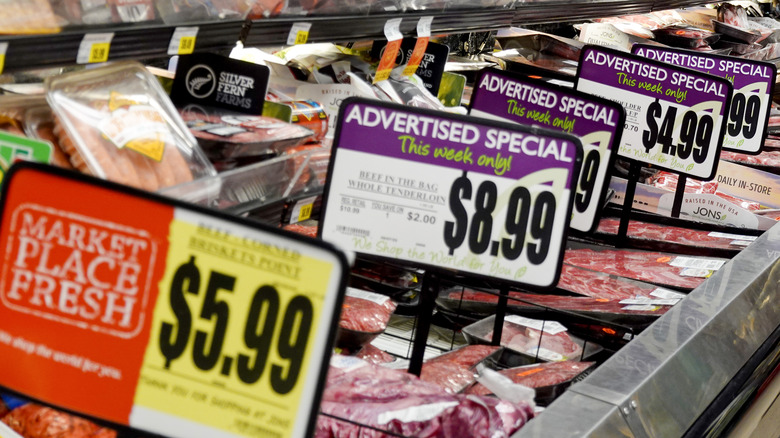Why You Might Be Seeing Fewer Sales At Your Local Grocery Store
Earlier this year, Walmart shocked both shareholders and analysts by slashing its profit expectations for the year, because its customer base was seen to be cutting back on discretionary items, such as electronics and clothing, in order to focus their spending on essentials like food. As a result, the discount retailer was facing a high inventory of items customers didn't want, forcing them to offer big discounts just to get its overstock out of the way (per CNBC). At the time, the store's CEO Doug McMillon had warned that "The increasing levels of food and fuel inflation are affecting how customers spend, and while we've made good progress clearing hardline categories, apparel in Walmart U.S. is requiring more markdown dollars," per Walmart.
But while we've been seeing some good deals while shopping at retailers like Walmart, as well as specialty goods manufacturers like Nike, and even department stores like Macy's, the same cannot be said of groceries. The Wall Street Journal states that American shoppers are finding fewer "buy-one, get-one-free" deals, and citing research from Information Resources, the Journal also reported fewer promotions today than there were in 2019.
And there's a reason for this.
Food manufacturers are still facing supply chain challenges
Back in May, The Wall Street Journal said food manufacturers were going through the same ingredient shortages and supply chain challenges that they experienced during the pandemic, which meant fewer items appearing on supermarket shelves. And the situation has not changed much since that time. While there are no food shortages at the moment, per USDA, rising food costs are forcing manufacturers to continue to make adjustments to their production outputs and volumes (per ING Bank). ING reports marketing budgets are being impacted by these changes too, and The Wall Street Journal says as a result, supermarket owners end up using their own funds "to advertise and support discount deals."
As an example, the WSJ says it spoke to one Chicago supermarket general manager who says he hasn't been able to run any promotions on dairy in nearly five months; the manager also said he turned down the opportunity to stock lesser-known items in exchange for a bulk discount since he needed the shelf space to display items he knew customers wanted to buy. Circumstances like these could lead to certain items disappearing from grocery store shelves.
The situation is frustrating for consumers and business owners, and the WSJ says discounts and promotions aren't likely to make a comeback at least until manufacturers see a definite end to supply chain challenges. Unfortunately, with wars and climate change-related disruptions, per ING, that may not happen anytime soon.

